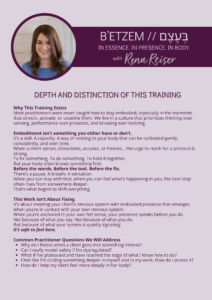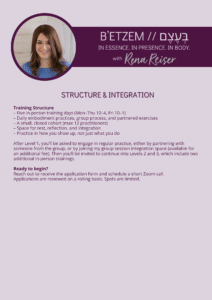Building your inner Beis Hamikdash
The 17th of Tammuz: Feeling the Lack, Opening to Shefa
On days like these, during the Three Weeks, we have this desire to connect to something that is unknown to us. But every single one of us wants to be able to receive guidance in our lives from Hashem directly.
Even in Galus, we have the ability to tap into it.
It may be blocked, but we can start by doing what we are capable of, what is available to us, even in Galus. And showing Hashem how we’re trying and willing to take those steps forward is already us doing something to try to bring that back into the world.
The Shefa is flowing. It’s we who are blocked
The Sifsei Chaim explains that even when Hashem seems to be constricting His Shefa in the world, it’s not a real constriction on His part. It’s that we, the receivers, because of our actions, are unable to take in the full hashpa’ah.
Rav Dessler gives a mashal: someone is sitting in his house and the sun is shining in full force outside, but the light isn’t getting in because the windows are dirty. The sun is still shining. The blockage is in the receiving.
Our “dirty windows” are caused by our actions that have kept us in Galus. Our dysregulation, our lack of embodied presence are symptoms of that.
Feeling the symptom is the beginning of healing
Imagine a person who has symptoms of a serious illness but doesn’t go to the doctor. He doesn’t know how sick he really is, because he hasn’t gone deeper.
But if he investigates it, gets it checked, understands what’s actually going on, then he knows what needs to happen. The Sifsei Chaim uses this mashal to explain how this knowing is the beginning of healing.
It’s the same with us.
When we deal only with the symptom level of our issues, the practical struggles of Galus, we miss what’s really happening. But when we go deeper and actually feel what it feels like inside to not have Hashem’s presence fully in the world, when we allow ourselves to feel the lack… that’s already part of revealing His kavod.
That’s already the beginning of Geula.
And it’s the same in our personal lives, whether we or our clients are struggling with addiction, disordered eating, chronic pain, relationship issues, or anything else. When someone is willing to go deeper and not just talk about it but actually sense into it in the body, they begin to know how deeply it’s affecting them. Not just in their minds, but in their whole selves. That already starts the healing process.
The inner Mikdash
The Sifsei Chaim also says:
“A person who prepares within himself the Beis HaMikdash, a place for Hashem’s shechinah and the increase of kevod Shamayim, he is a person connected to the outer Beis HaMikdash.”
This is someone who aspires to come close to Hashem.
This is someone who merits to mourn Yerushalayim.
And then the main thing that’s missing becomes clear: we don’t have a Beis HaMikdash.
There’s a cyclical effect happening here: the aspiration leads to the mourning, and the mourning deepens the yearning, and the yearning becomes the beginning of rebuilding.
This is the work I teach
When I first learned the idea that a person who lets go of grasping, clears his mind, and receives Hashem’s answer through Shefa, I realized that this is exactly the process I guide women into.
We go into a space where we can let go of what we already know, and sit with the sensations that arise. Let them be there. Make space.
Quieting down our minds.
Quieting down our bodies.
By being with all that.
We make ourselves into a vessel to receive Hashem’s Shefa.
When we’re with a client and we feel stuck, we can learn how to quiet down our own minds by being with whatever is arising within us. We can make space for Hashem to guide us in the next step. And then we can teach our clients to do the same.
We are the Mishkan
When we’re in Galus, the resting place for Hashem is in each one of our bodies.
We are the Mishkan of Hashem’s presence in Galus.
And so when we build ourselves and connect to what that is like, we’re already starting the process of Geula.
We have to start with feeling the lack.
Really being with that.
Making space for what it feels like to not have the answers.
To not know how to move forward.
To not be able to receive the Shefa.
To mourn that.
And to make space for it within us.
Then we’ll be able to rebuild.
If you’re feeling the ache of Galus today: the confusion, the symptoms, the stuckness, know that the ache itself matters. Feeling the lack is not failure. It’s the beginning of rebuilding. It’s the doorway to becoming a vessel again.
If this way of working speaks to something inside you and if you want to learn how to guide others from this place, or simply deepen your own inner rebuilding, apply for your spot in my upcoming facilitator training, B’Etzem.



